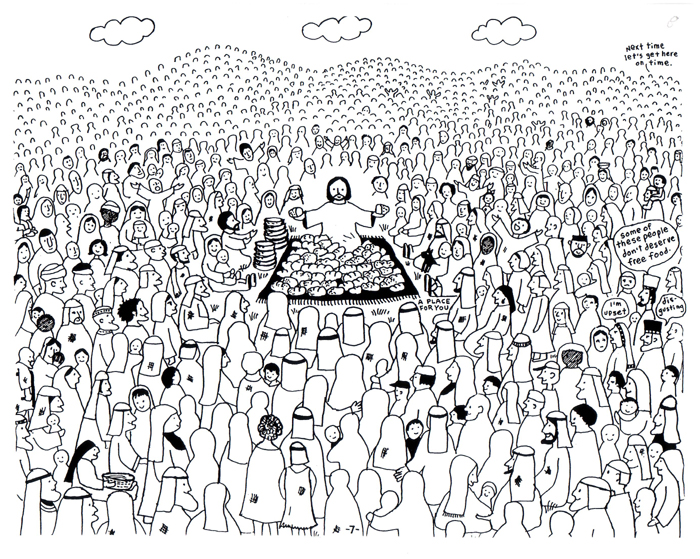
1. Church of Scotland – The Most effective leader
The most effective leader is not necessarily the one who is most qualified on paper, the one expected to step up due to experience, but rather the one with the essential qualities, the one who steps out in faith, the one who expects God to act and doesn’t rely on their own expectations.
The world would see the young boy as the least of them, yet he was one Jesus chose. Age or experience is no barrier to Christ’s lesson for us all to offer what we have and see what Jesus will do, in abundance. Jesus could have performed this miracle and fed them without the boy’s offering, without asking the disciples to solve the problem of how to feed them, without having so much left over. But as with most of Jesus’ miracles and teachings, He worked through people, teaching valuable lessons about living a life of faith for God, with God. All through Jesus’ earthly life He stayed firmly rooted in His Heavenly Father and has taught us to do the same
2. The Need To Share
In an article titled “The Bottleneck” the following astounding claim was made:
“For every person in the world to reach present U.S. levels of consumption with existing technology would require four more planet Earths.” (Scientific American February 2003)
Our society of reckless consumption will someday be the material of historic legends.
I think the miracle here is the faith in God and the willingness to share even when the resources seem so inadequate.
I’m sure many know the legend of stone soup and I’m sure many do not so I will share it briefly this weekend.
Once upon a time, somewhere in Eastern Europe, there was a great famine. People jealously hoarded whatever food they could find, hiding it even from their friends and neighbors. One day a peddler drove his wagon into a village, sold a few of his wares,and began asking questions as if he planned to stay for the night.
“There’s not a bite to eat in the whole province,” he was told. “Better keep moving on.”
“Oh, I have everything I need,” he said. “In fact, I was thinking of making some stone soup to share with all of you.” He pulled an iron cauldron from his wagon, filled it with water, and built a fire under it. Then, with great ceremony, he drew an ordinary-looking stone from a velvet bag and dropped it into the water.
By now, hearing the rumor of food, most of the villagers had come to the square or watched from their windows. As the peddler sniffed the “broth” and licked his lips in anticipation, hunger began to overcome their skepticism.
“Ahh,” the peddler said to himself rather loudly, “I do like a tasty stone soup. Of course, stone soup with CABBAGE — that’s hard to beat.” Soon a villager approached hesitantly, holding a cabbage he’d retrieved from its hiding place, and added it to the pot. “Capital!” cried the peddler. “You know, I once had stone soup with cabbage and a bit of salt beef as well, and it was fit for a king.”
The village butcher managed to find some salt beef…and so it went, through potatoes, onions, carrots, mushrooms, and so on, until there was indeed a delicious meal for all. The villagers offered the peddler a great deal of money for the magic stone, but he refused to sell and traveled on the next day. And from that time on, long after the famine had ended, they reminisced about the finest soup they’d ever had.
I think of the lines of people waiting for food, pushing and surging under the watchful eyes of soldiers armed with guns. We have created many problems in this world by our guarded sharing and rampant consumption.
When will we learn that contrary to the current administration’s thinking, peace and posperity comes not from the barrel of a gun but compassion and the openness to share.
3. William Loader
The rest of the chapter will expand the bread image, so that the real meaning of the event is that it was a symbol that Jesus offers the true bread, is the true bread and will be broken and shared in the bread and wine of the eucharist. As the healing of the blind man in John 9 points to Jesus as the light of the world (‘I am the light of the world’) and the raising of Lazarus in John 11 points to Jesus as the resurrection and the life (‘I am the resurrection and the life’), so here: Jesus declares, ‘I am the bread of life’ (6:35).
4. Chasing Jesus
“Love that feeds hungry crowds cannot be explained. Love that turns no one away cannot be explained. Love that causes one to sacrifice oneself for the sake of another cannot be explained.” -“Chasing Jesus,” William H. Lamar, IV, “Chasing Jesus,” The Christian Century, 2003.
5. Hitchhiking the Bible
This was so powerful an event, all of Jesus’ meals were so powerfully a part of the wholistic mission, that his followers would gather regularly during the week. They understood that feeding people was essential so they found those left out of the Roman daily distribution and fed them. Food and mission are one in the same. The tiny morsel of bread we consume at the Eucharist is to be a reminder of the greater mission all around us. When a church looses its connection to food and a common table for a shared meal it has lost much indeed.
